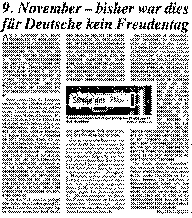
 ,
Monday, November 13th, 1989, p. 6
,
Monday, November 13th, 1989, p. 6
Both of the men were on the list of war criminals produced by the allied victors. One of the conditions for the truce had been their abdication. William II abdicated as emperor, although retaining the illusion that he could remain King of Prussia. Prince Max of Baden also passed over the imperial chancellery on to the leader of the SPD Frederick Ebert. It was suggested that a National assembly should decide on the future form of government, but this proved to be unnecessary. At noon the SPD representative Philipp Scheidemann declared the German Republic, before a gathering of nervous people in front of the Reichstag. "The German people have won!" he proclaimed.
Had the people really won? Or had the allies won? In any case it was a sad day, and a poor beginning for the first German republic. The Emperor fled to Holland and the imperial counts and noblemen, the traditional leading classes, stood down without a murmur. They left behind them a power vacuum. The mood after 4 years of war without victory, with the merciless hunger blockade of the allies, was nothing like the excitement with which the German people had greeted war at the beginning of August 1914.
Do historical dates have magical powers? The standard historians obviously don't think so. But the 9th November 1918 had immediate and long-term consequences for the course of German history. Aware of the significance of the date, Adolf Hitler, at the head of the first national socialist "movement" in Munich, tried to grab power five years later. But the coup collapsed under fire from the Bavarian police. Hitler wanted to shoot himself, and he was only prevented from doing so by his friends.
The coup had begun in the "Bürgerbräukeller", where there began to be an annual pseudo-cult memorial celebration with Hitler and the "old Fighters" after 1923 on 8th and 9th November. It was here on 8th November 1938 that it was revealed that an official in Paris had been severely injured by a young Jew. This was the signal for the initiation of the first activity against the Jews, with the burning of synagogues. That was the worst 9th November that we have ever had. Again in connection with the memorial celebrations in Munich on 8th and 9th November a fanatic Hitler-hater, George Elser, attempted to kill him with a time bomb, which very nearly succeeded. Thus all of these dates are days of sorrow.
The fifth "9th November" that we experienced on Friday, is for the first time in our history a day of happiness. The Germans have fought for their freedom of movement. We still don't know how it will continue. But it is only through looking at the past that the historical significance of 9th November 1989 can really be understood.